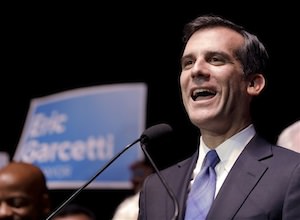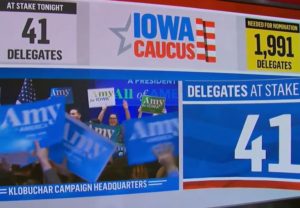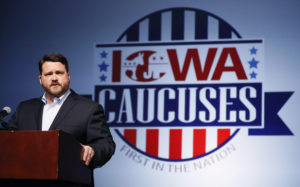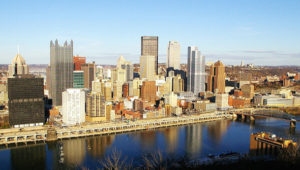Does Anything Change in Los Angeles With Election of New Mayor?
The Los Angeles election Tuesday again revealed a city unlike most of the country -- more liberal, more deeply Democratic, yet also more interested in medical marijuana than the troubles of the poor. The L.A. election Tuesday again revealed a city unlike most of the country -- more liberal, more deeply Democratic, yet also more interested in medical pot than the troubles of the poor.
The Los Angeles election Tuesday again revealed a city unlike most of the country — more liberal, more deeply Democratic, yet also more interested in medical marijuana than the troubles of the poor.
“Southern California, an island on the land,” is how Carey McWilliams, the late historian and editor of The Nation, once described L.A. and the area around it. “A region geographically attached, rather than functionally related, to the rest of America,” McWilliams wrote in 1946 of the place he loved.
The next politician who will try to preside over Los Angeles is the new mayor, Eric Garcetti, 42, a city councilman who exemplifies all of L.A.’s contradictions and clichés.
He’s a good-looking man, well turned out in a stylishly conservative way, a perfect fit for the trendy restaurants, clubs and galleries of the Hollywood-area district he represents. Ethnically, he’s all but perfect for a city of great diversity. His father, former District Attorney Gil Garcetti, is Mexican-American and Italian. That heritage and his fluent Spanish helped the younger Garcetti win a significant number of Latino votes. His mother is Jewish. Garcetti, who attends synagogue services on the High Holidays and some Sabbaths, will be Los Angeles’ first Jewish mayor.
Garcetti defeated City Controller Wendy Greuel 181,995 votes to 155,497, a small percentage of the nearly 2.5 million registered voters and of the 3.8 million people living in the city. The fact that he was elected by such a tiny part of L.A.’s population shows how hard it will be to get residents to join him in attaining the goal he set for himself on election night: “Let’s make this a great city again.”
His job will also be made difficult by the poisonous domination of money in the election. In that respect, Los Angeles isn’t much different from the rest of the country. A record $32 million was poured into the race, either money raised by the candidates or from “independent expenditure” committees, L.A.’s version of the super PACs legalized by the Supreme Court’s Citizens United decision. In Los Angeles, civic engagement is in the hands of a few campaign contributors—developers, other businesses that depend on City Hall for permits and subsidies, and the labor unions.
Walking—or as is more common, driving—around Los Angeles, it is easy to see the results of a city run by a government disconnected from its residents.
What is striking is the number of medical marijuana shops, made possible by a state law legalizing the practice. These businesses have proliferated in L.A. because of the city’s inability to find a way to regulate them. In Tuesday’s election, voters approved a measure limiting the number of pot shops to 135, a cap authorized in 2007 when the city placed a moratorium on them.
That ordinance, however, was riddled with loopholes and exceptions, driven by the increasingly well-funded, savvy and generous political campaign contributors of the marijuana lobby. Although a UCLA study pegged the number of shops at 472, the city estimates there are currently more than 1,700. With the marijuana industry having exerted influence in the courts and at City Hall, and now ready to shoot holes in the new law, it’s hard to see how the number of shops will decrease.
Wherever you go in the city, you see the dispensaries. Some are discreet, marked by a green cross, while others, such as those on the flamboyant Venice Beach boardwalk, have salespeople in front pitching potential customers in the manner of old-time carnival barkers. Even supporters of medical cannabis wonder whether anyone is in charge, other than the big marijuana political contributors and lobbyists. The logical question is what use is a city government if it can’t control an industry free to foist all kinds of unregulated, untested pot on the public.
And observant pedestrians and motorists alike are struck by another feature of Los Angeles: the number of homeless on the streets.
There are estimated to be about 254,000 homeless people in L.A. County, 25 percent of whom are believed to be mentally ill. Half of them are black even though African-Americans make up just 9 percent of the county’s population. In downtown, they occupy the streets of Skid Row, not far from newly gentrified neighborhoods of apartments, condos and restaurants whose foodie patrons waste enough to nourish their dumpster-diving homeless neighbors. In other areas of the city, they have become part of the landscape, rising ghost like from alleys and doorways as the day begins. They are the most painful evidence of a vast and ignored population of poor and mentally ill.
Why even bother to vote for mayor if government fails to address these problems? That’s the question incoming Mayor Garcetti should answer. If he does, this “island on the land” may actually provide lessons for the rest of the nation.
Your support matters…Independent journalism is under threat and overshadowed by heavily funded mainstream media.
You can help level the playing field. Become a member.
Your tax-deductible contribution keeps us digging beneath the headlines to give you thought-provoking, investigative reporting and analysis that unearths what's really happening- without compromise.
Give today to support our courageous, independent journalists.




You need to be a supporter to comment.
There are currently no responses to this article.
Be the first to respond.